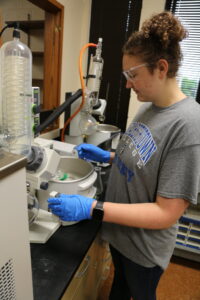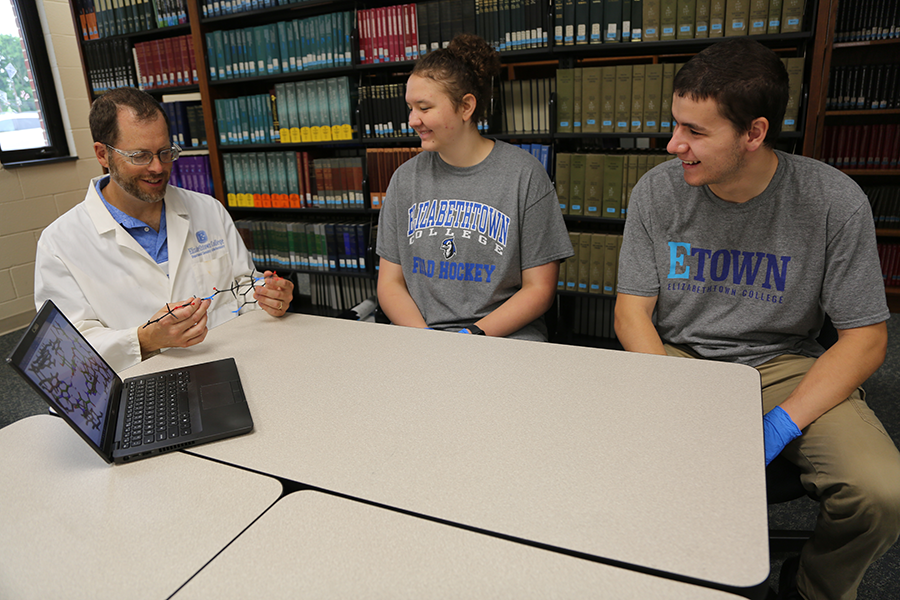Elizabethtown College students Tristan Mabee ’24 and Angelina Giglio-Tos ’25 are studying ribonucleic acid (RNA) and gaining an in-depth understanding about its fundamental functions. They are making molecules designed to recognize specific sequences of RNA, which allow scientists to better understand strands of RNA.
Their study is part of overarching research conducted over eight years in collaboration with Binghamton University and researchers from Latvia and is funded by the National Science Foundation (NSF). It is also a continuation of past independent student research and faculty mentor collaborations as a part of the Summer Creative Arts and Research Program (SCARP) program.
Title of Research
Nucleobase-Modified Peptide Nucleic Acids for Sequence Selective Triple-Helical Recognition of Non-Coding RNA
Student Researchers
Tristan Mabee ’24 (Biochemistry and Molecular Biology major)
Angelina Giglio-Tos ’25 (Chemistry major)
Faculty Mentor
James MacKay, A.C. Baugher Professor of Chemistry
What are you researching?
Tristan: We’re continuing research investigating molecular RNA recognition using peptide nucleic acids with synthetic nucleobases. RNA is a biologically valuable molecule but lacks effective tools for study. Noncoding RNA generally forms double helical motifs, which form an attractive site for recognition using a triplex forming oligonucleotide strategy, in this case synthetic nucleobases with a PNA backbone. PNA is advantageous as it is neutral, sidestepping any electrostatic repulsion issues, while forming similar configurations to the phosphate backbone seen in RNA. Over the course of this project, I have focused on synthesizing the synthetic nucleobases and then subsequently coupling them to PNA, followed by forming chains of these molecules which are then investigated by the Rozners group at Binghamton.
Why did you choose this topic?
Tristan: I’ve been working under Dr. MacKay for a while now. This project was a natural continuation of my previous work as my skills and confidence in synthesis has increased. Additionally, this work has continued to be interesting to me, making it an even more natural choice.
Angelina: I did not have much experience in organic chemistry, except for one semester. However, I found it to be very interesting. I was excited to apply the things I learned to this summer’s research. Additionally, I will be able to apply this research in my following years of chemistry.
What is the most interesting aspect of the research?
Tristan: As I begin to understand more about this work, what really shines through is the beautiful marriage of chemistry and biology. Fundamentally, RNA recognition is a biological problem, but through chemical synthesis, we are developing tools that provide a solution.
Angelina: The most interesting aspect of this research is that it requires different ways of thinking and creates new challenges to overcome. However, once solutions have been made, it feels great to know that something has been accomplished.
How has your faculty mentor helped you?
Tristan: Dr. MacKay has high expectations as a mentor but has been fair as well. He is always willing to explain and discuss questions or blocks I’ve run into when performing my chemistry. Furthermore, he has focused greatly on my larger chemical skills, pushing me to work more efficiently and intelligently. This greatly increases my skills in synthesis, making me far more hirable post-graduation.
Angelina: Dr. MacKay has been very helpful and patient with the experiments I’ve been running. He is always willing to explain something to me but at the same time allows me to figure things out myself.
Hear from the faculty mentor – James MacKay
“Working with undergraduates in a research setting is one of my favorite parts of my job,” MacKay said. “They are enthusiastic and energetic. While the learning curve can be steep for our project, the fact that both of these students are starting so early will afford them the chance to grow with the project. If they were to choose, this is likely to be their senior research project as well.
“To do this as an international collaborative project with scientists at Binghamton University and the Latvian Institute for Organic Synthesis raises the level of the science we are able to do. For undergraduates to have this experience, especially after just one year of college, it will only set them up for greater opportunities later on.”

